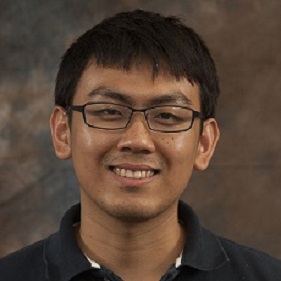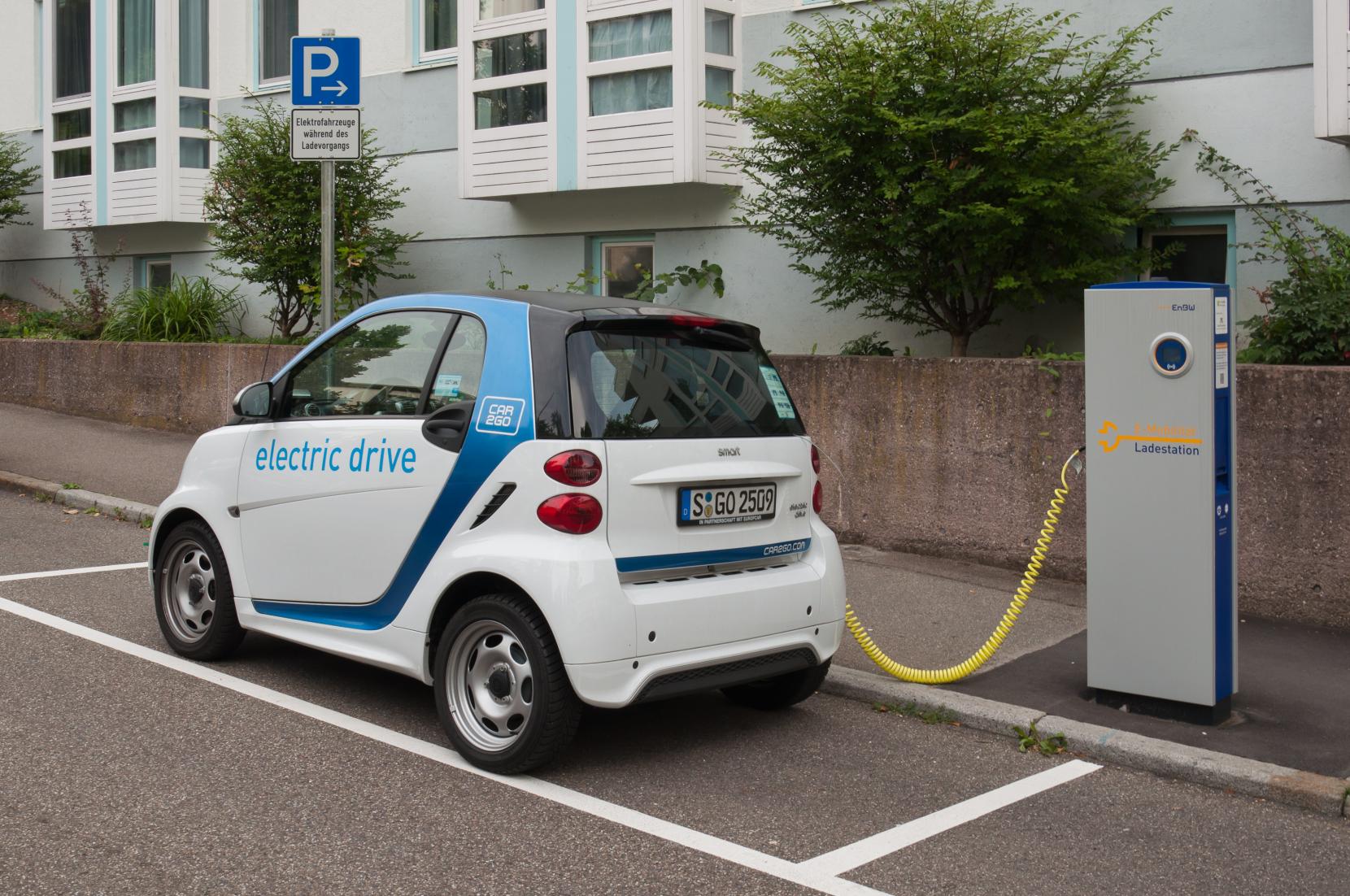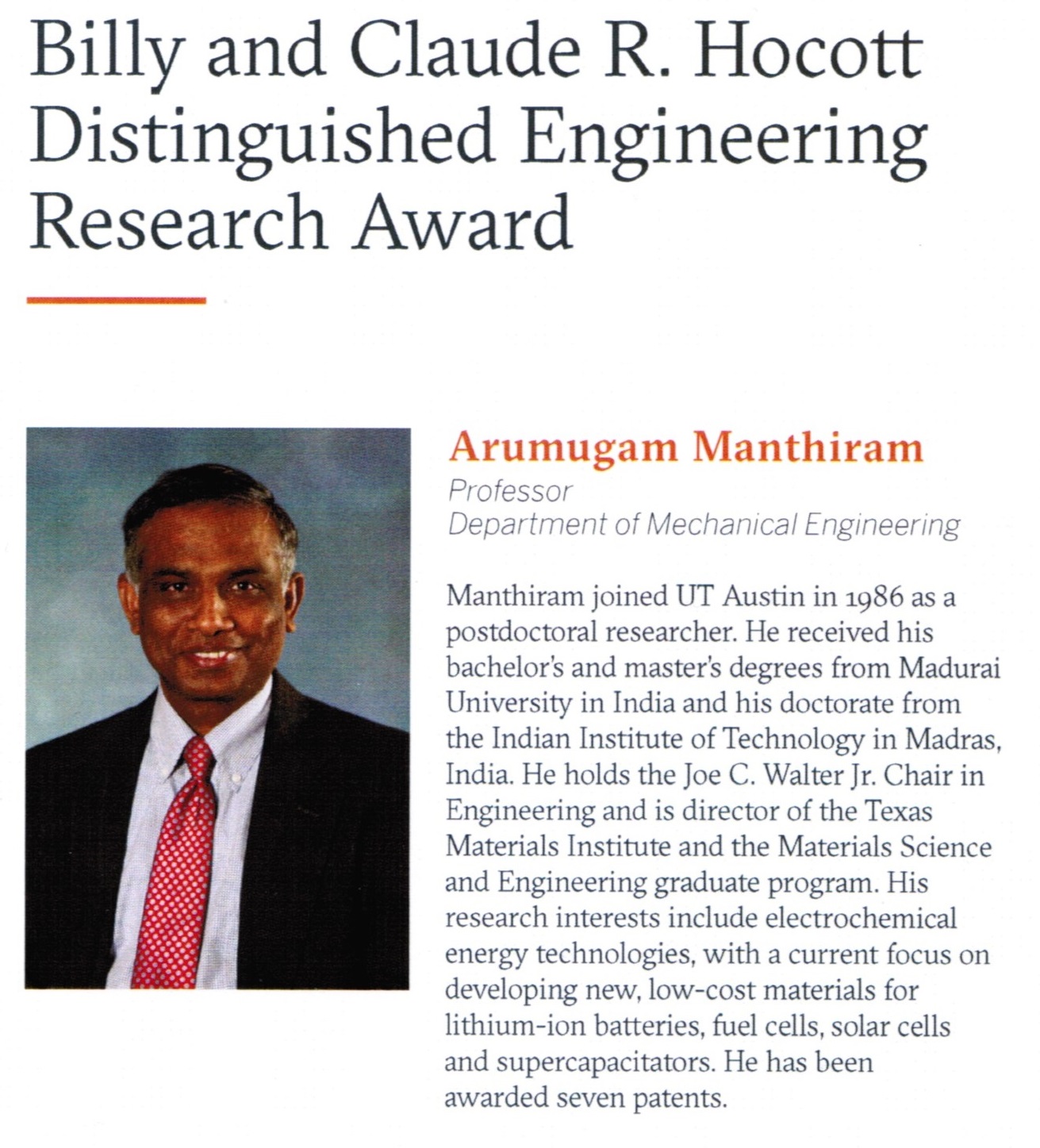A recent publication in Texas Connect magazine features Dr. Manthiram’s praise for the work and lifetime achievements of Dr. John Goodenough. Dr. Manthiram highlights the 2019 Nobel Prize in chemistry winner for his passion for science, his mentorship and inspiration, and finally his impact on society in the energy area.
Uncategorized
Dr. Manthiram Delivers Talk for 2019 Nobel Prize in Chemistry Recipient Dr. Goodenough
Congratulations to Dr. John Goodenough for his Nobel Foundation honor, and to Dr. Manthiram who presented on his contributions at the recognition ceremony in December 2019 . For an in-depth account of the event, see this article in the Alcalde where UT President Dr. Gregory Fenves recounts this prestigious occasion.
Watching UT Professor John Goodenough Receive the Nobel Prize in Sweden
Prof. Manthiram featured in Cambridge EnerTech Podcast
Cambridge EnerTech conducted an interview with Professor Manthiram in preparation for the 8th Annual Battery Safety Conference taking place in Arlington, Virginia, in November 2017. To view the full interview transcript, please click the link below to be directed to the EnerTech website.
Full Podcast Interview Transcript
Fellowship Awarded to Manthiram Group Graduate Student

Congratulations to Chi-Hao Chang for being awarded the Graduate Continuing Fellowship from the University of Texas at Austin. This prestigious award carries extreme competition and is a reflection of the Manthiram group’s commitment to producing not only quality work but high quantities of work, as well. Thank you to Chi-Hao for all of your hard work and dedication.
Battery Research Consortium Chosen by DOE to Advance Electric Cars
(Article copyright of UT News. The original article can be found here)
July 27, 2016

AUSTIN, Texas — The Department of Energy has selected Battery500, a national consortium led by Pacific Northwest National Laboratory (PNNL) including Arumugam Manthiram of The University of Texas at Austin as its chief scientist, to help lead a new five-year, $50 million initiative to advance battery technology in electric cars.
Electric cars should be more common and affordable if the new national research effort achieves its ambitious goal of significantly improving the batteries that power today’s electric vehicles.
The Battery500 consortium will receive up to $10 million per year from the Department of Energy’s Office of Energy Efficiency and Renewable Energy, the White House has announced. The multidisciplinary research group includes leaders from DOE national labs, universities and industry, all of which are working together to make smaller, lighter and less expensive batteries that can be adopted by manufacturers.
As chief scientist of the consortium, Manthiram, a mechanical engineering professor in the Cockrell School of Engineering who serves as the director of the Texas Materials Institute at UT Austin, will help oversee keystone projects and will collaborate on technical development and delivery.
In addition to Manthiram, professor John Goodenough, inventor of the lithium-ion battery cathode materials, will contribute his knowledge and expertise to the consortium. UT Austin will be focused on the development of electrode materials to increase energy density.
“The Battery500 consortium is truly a dream team of battery materials and evaluation experts,” Manthiram said. “We are thrilled to help lead this effort to develop next-generation lithium batteries that can speed up the adoption of electric vehicles.”
Beyond PNNL, the consortium includes the following partners:
- Brookhaven National Laboratory
- Idaho National Laboratory
- SLAC National Accelerator Laboratory
- Binghamton University (State University of New York)
- Stanford University
- University of California, San Diego
- University of Texas at Austin
- University of Washington
- IBM (advisory board member)
- Tesla Motors Inc. (advisory board member)
Battery500’s aggressive goal is to develop lithium-metal batteries that have almost triple the “specific energy” found in the batteries that power today’s electric cars. Specific energy measures the amount of energy packed into a battery based on its weight. Because electric vehicles (EVs) need to be lightweight to drive farther on the same charge, EV batteries with high specific energies are essential.
The team hopes to reach this goal by focusing on lithium-metal batteries, which use lithium instead of graphite for the battery’s negative electrode. The team will pair lithium metal with two different materials for the battery’s positive electrode. While studying these materials, the consortium will prevent unwanted side reactions in the whole battery that weaken a battery’s performance.
A key focus of the consortium is to ensure that the technological solutions it develops meet the needs of car and battery manufacturers. While the project is ongoing, consortium members will work to ensure that significant innovations can be quickly and seamlessly implemented by industry.
Recognizing diversity in experience and opinions often results in better solutions, the consortium will also welcome ideas from others. The team will set aside 20 percent of its overall budget for what it is calling “seedling projects,” or work based on proposals from the larger battery research community.
Though the immediate goal is to make effective, affordable batteries for EVs, the consortium believes its work could also advance stationary grid energy storage.
More information on the White House’s July 21st electric transportation announcement can be found here:
For more information, contact: Sandra Zaragoza, Cockrell School of Engineering, 512-471-2129.
Manthiram Receives the Billy and Claude R. Hocott Distinguished Engineering Research Award

Professor Arumugam Manthiram has received the Billy and Claude R. Hocott Distinguished Engineering Research Award 2016 from the Cockrell School of Engineering.
About the Award
“This award recognizes a faculty member whose documented research has significantly advanced the engineering profession. The Hocott family endowed this award in 1982 in honor of Mrs. Billy Hocott, who earned a degree in anthropology from The University of Texas at Austin and long supported research and scholarship. Her husband, Claude Hocott, earned his bachelor’s, master’s and doctoral degrees in chemical engineering from UT Austin and later became executive vice president of Exxon Production Research Company. Upon his retirement, Hocott served as acting chair of the Department of Petroleum and Geosystems Engineering.” (source: Cockrell School of Engineering, Faculty Reception 2016 program)
The formal awards ceremony was hosted Wednesday, September 7, 2016 in the Carpenter-Winkel Centennial Room of the Darrell K. Royal-Texas Memorial Stadium from 4:00 PM – 6:00 PM.
